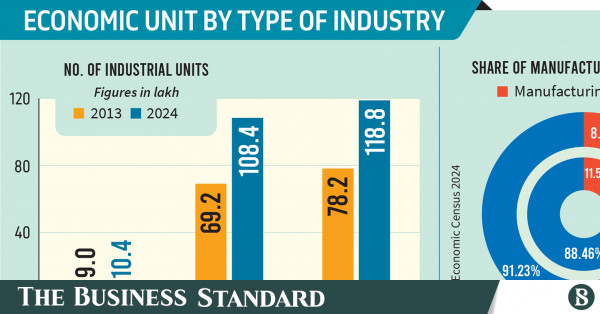The latest Economic Census 2024, set to be released today (29 January), reveals that the country has 11.87 million economic units (establishments engaged in economic activities), with manufacturing accounting for 8.77%
Infographics: TBS
“>

Infographics: TBS
Bangladesh has experienced a downturn in manufacturing over the last decade, coupled with a surge in the services sector — marking a shift away from the typical pattern seen in developed economies.
Unlike advanced nations, which transition to service-led growth after robust industrialisation, this shift in Bangladesh points out structural weaknesses, and policy inconsistency including a lack of investment in manufacturing and an increasing reliance on imported goods, according to economists and businesses.
They warn that such a transition, often termed “premature deindustrialisation,” could undermine the country’s long-term economic resilience, as manufacturing traditionally plays a vital role in creating jobs, boosting productivity, and fostering export growth.
The growing prominence of services, while significant, is yet to compensate for the economic contributions lost from the decline in industrial activities, they said.
The latest Economic Census 2024, set to be released today (29 January), reveals that the country has 11.87 million economic units (establishments engaged in economic activities), with manufacturing accounting for 8.77% and service-related units making up 91.23%. In comparison, the manufacturing sector represented 11.54% of economic units in the 2013 Census and 12.14% in the 2003 Census.
According to the Bureau of Statistics census, the number of manufacturing units in Bangladesh nearly doubled between 2003 and 2013, but growth slowed to just 15% in the following decade (2013-2024). In 2003, there were 450,348 manufacturing units, which rose to 902,583 in 2013, but by 2024, the figure had only increased slightly to 1.04 million units.
May hinder sustainability
M Masrur Reaz, chairman of Policy Exchange Bangladesh, told TBS, “The decline in manufacturing growth alongside the rapid expansion of the service sector sends mixed signals. The service sector, largely retail-based and reliant on selling manufactured goods, cannot adequately generate jobs for the 20 lakh youths entering the labour market annually. Strengthening the manufacturing sector is crucial for employment creation.”
He said the shift in consumption patterns is driving service sector growth, but its sustainability depends on manufacturing.
A declining manufacturing sector threatens purchasing power and the service sector’s ability to innovate. Without strong manufacturing growth, the service sector’s expansion may falter, hindering sustainable economic development, Masrur Reaz added.
The manufacturing decline over the last decade has hindered employment growth. While employment in economic establishments doubled between 2003 and 2013, it grew by only 50% in the subsequent decade.
According to the 2003 Economic Census, total employment in economic units was over 1.12 crore. By 2013, this number had increased to over 2.45 crore. However, by 2024, it rose by only 50%, reaching over 3.08 crore.
‘A troubling sign’
Economists and business leaders view the decline as a troubling sign for Bangladesh’s economy. In a labour-intensive country, the lack of expansion in manufacturing limits value addition and stifles per capita income growth.
Key barriers to manufacturing growth include poor infrastructure, an energy crisis, inconsistent revenue policies, and frequent shifts in financial policies.
Major manufacturing nations like Japan, China, South Korea, and Germany first achieved high employment and per capita income through robust industrial investment before shifting focus to the service sector.
In contrast, Bangladesh’s manufacturing growth is declining before achieving the desired investment and employment levels, while business interest shifts toward the service and trading sectors.
Why didn’t manufacturing grow?
Former FBCCI president Md Jashim Uddin told TBS, “Aside from a few BSCIC plots, Bangladesh has lacked significant industrial infrastructure investment for years. High land prices and development costs make manufacturing investment costly, and while economic zones have been launched, none are fully investment-friendly.”
Securing gas connections has been difficult for years, and energy crises make manufacturing investments riskier. High costs and operational challenges deter many, leaving small businesses with limited opportunities in manufacturing, he continued.
Industrial infrastructure, energy, and consistent policies, including revenue policies, are vital for manufacturing growth. Without these, Bangladesh has yet to become the manufacturing hub it should be, Jashim added.
Experts call for investment-friendly policy reform
Khondaker Golam Moazzem, research director at the Center for Policy Dialogue (CPD), said while countries typically transition from agriculture to industry and then to services for sustainable development, Bangladesh’s economy is shifting from agriculture to service, bypassing the industry.
Even those investing in the productive sector are focusing on small-scale units rather than permanent industrial entities, leading to informal, low-earning, and substandard economic activities that fail to drive overall growth, he said.
Moazzem said the decline in industrial growth highlights serious flaws in government policies. He urged the government to urgently review policies related to income tax, customs and VAT, currency, and finance to make them more industry-friendly.
Abul Kasem Khan, former president of the Dhaka Chamber of Commerce and Industry (DCCI), echoed concerns, saying, “Long-term investment plans are essential for the manufacturing sector. However, in Bangladesh, tax and revenue policies change annually, leaving businesses unsure about the profitability of their investments. As a result, many are opting to invest in trading and services instead of risking their capital in manufacturing.


